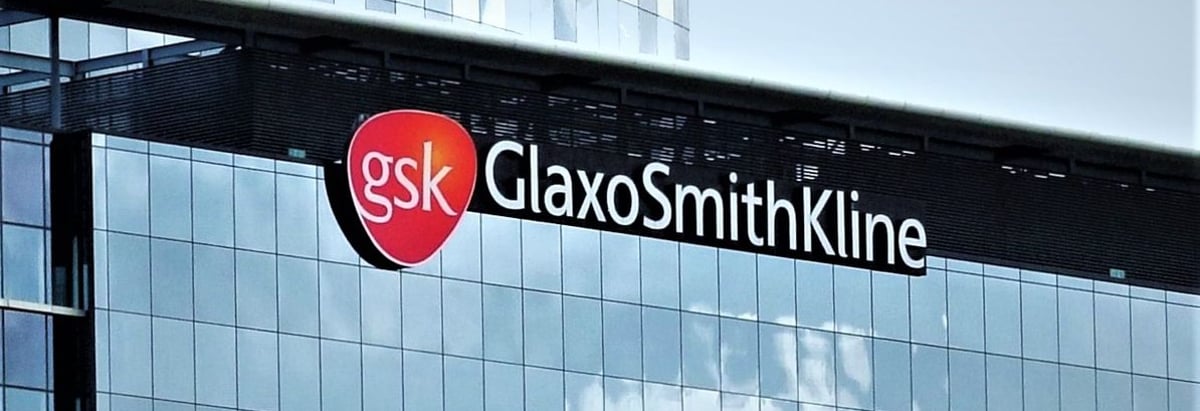Stock Analysis
- United Kingdom
- /
- Pharma
- /
- LSE:GSK
Dividend Investors: Don't Be Too Quick To Buy GSK plc (LON:GSK) For Its Upcoming Dividend

GSK plc (LON:GSK) is about to trade ex-dividend in the next four days. The ex-dividend date is usually set to be one business day before the record date which is the cut-off date on which you must be present on the company's books as a shareholder in order to receive the dividend. The ex-dividend date is of consequence because whenever a stock is bought or sold, the trade takes at least two business day to settle. Therefore, if you purchase GSK's shares on or after the 14th of November, you won't be eligible to receive the dividend, when it is paid on the 9th of January.
The company's upcoming dividend is UK£0.15 a share, following on from the last 12 months, when the company distributed a total of UK£0.58 per share to shareholders. Calculating the last year's worth of payments shows that GSK has a trailing yield of 4.2% on the current share price of UK£13.81. We love seeing companies pay a dividend, but it's also important to be sure that laying the golden eggs isn't going to kill our golden goose! We need to see whether the dividend is covered by earnings and if it's growing.
Check out our latest analysis for GSK
If a company pays out more in dividends than it earned, then the dividend might become unsustainable - hardly an ideal situation. GSK paid out 99% of its earnings, which is more than we're comfortable with, unless there are mitigating circumstances. That said, even highly profitable companies sometimes might not generate enough cash to pay the dividend, which is why we should always check if the dividend is covered by cash flow. It distributed 49% of its free cash flow as dividends, a comfortable payout level for most companies.
It's good to see that while GSK's dividends were not well covered by profits, at least they are affordable from a cash perspective. Still, if this were to happen repeatedly, we'd be concerned about whether the dividend is sustainable in a downturn.
Click here to see the company's payout ratio, plus analyst estimates of its future dividends.
Have Earnings And Dividends Been Growing?
Companies with falling earnings are riskier for dividend shareholders. If business enters a downturn and the dividend is cut, the company could see its value fall precipitously. GSK's earnings per share have fallen at approximately 7.8% a year over the previous five years. Ultimately, when earnings per share decline, the size of the pie from which dividends can be paid, shrinks.
The main way most investors will assess a company's dividend prospects is by checking the historical rate of dividend growth. GSK has seen its dividend decline 5.1% per annum on average over the past 10 years, which is not great to see. It's never nice to see earnings and dividends falling, but at least management has cut the dividend rather than potentially risk the company's health in an attempt to maintain it.
Final Takeaway
From a dividend perspective, should investors buy or avoid GSK? It's never great to see earnings per share declining, especially when a company is paying out 99% of its profit as dividends, which we feel is uncomfortably high. Yet cashflow was much stronger, which makes us wonder if there are some large timing issues in GSK's cash flows, or perhaps the company has written down some assets aggressively, reducing its income. It's not an attractive combination from a dividend perspective, and we're inclined to pass on this one for the time being.
With that in mind though, if the poor dividend characteristics of GSK don't faze you, it's worth being mindful of the risks involved with this business. To help with this, we've discovered 4 warning signs for GSK that you should be aware of before investing in their shares.
A common investing mistake is buying the first interesting stock you see. Here you can find a full list of high-yield dividend stocks.
New: Manage All Your Stock Portfolios in One Place
We've created the ultimate portfolio companion for stock investors, and it's free.
• Connect an unlimited number of Portfolios and see your total in one currency
• Be alerted to new Warning Signs or Risks via email or mobile
• Track the Fair Value of your stocks
Have feedback on this article? Concerned about the content? Get in touch with us directly. Alternatively, email editorial-team (at) simplywallst.com.
This article by Simply Wall St is general in nature. We provide commentary based on historical data and analyst forecasts only using an unbiased methodology and our articles are not intended to be financial advice. It does not constitute a recommendation to buy or sell any stock, and does not take account of your objectives, or your financial situation. We aim to bring you long-term focused analysis driven by fundamental data. Note that our analysis may not factor in the latest price-sensitive company announcements or qualitative material. Simply Wall St has no position in any stocks mentioned.
About LSE:GSK
GSK
Engages in the research, development, and manufacture of vaccines, and specialty and general medicines to prevent and treat disease in the United Kingdom, the United States, and internationally.

